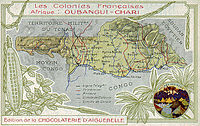| 1982 Central African Republic coup d'état attempt | |||||||
|---|---|---|---|---|---|---|---|
| |||||||
| Belligerents | |||||||
|
|
MLPC party | ||||||
| Commanders and leaders | |||||||
| André Kolingba |
Ange-Félix Patassé David Dacko | ||||||
|
|---|
 |
On 3 March 1982,[1] opposition politician and leader of the MLPC party, Ange-Félix Patassé, returned from exile to the Central African Republic and staged an unsuccessful coup against General André Kolingba (who himself took power in the 1981 coup d'état) with the help of a few military officers, such as General François Bozizé, who accused Kolingba of treason and proclaimed the change of power in a radio announcement.[2]
Four days later, having failed to gain the support of the Central African Armed Forces, Patassé went in disguise to the French Embassy in Bangui to seek refuge. After heated negotiations between the Kolingba government and France, Patassé was allowed to leave for exile in Togo, where he lived from 1982 until his return to the Central African Republic in 1992.[3][4] Bozizé fled to the north of the country with 100 soldiers,[5] before obtaining refuge in France.[6]
- ^ Alan Cowell (17 March 1982). "IN CENTRAL AFRICAN REPUBLIC, A COUP OR JUST A CHARADE?". The New York Times. Retrieved 23 June 2019.
- ^ Kalck 2005, p. xxxix.
- ^ "Angèle Patassé est décédée". Republic of Togo. 2007-12-05. Archived from the original on 2023-06-04. Retrieved 2023-08-28.
- ^ Doeden, Matt (2009). Central African Republic in Pictures (Visual Geography. Second Series). Twenty First Century Books (February 2009). p. 30. ISBN 978-1575059525.
- ^ Kalck 2005, p. 8.
- ^ Kalck 2005, p. xl.